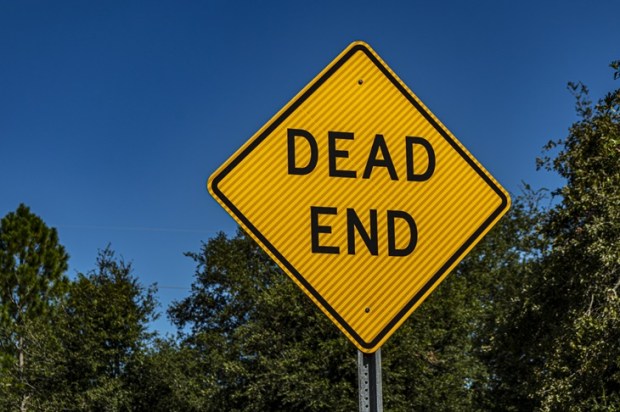Every time it seems society has reached peak idiocy, something else pops up on social media that makes us question the validity of the human race’s continued survival.
This time, people claim to be suffering from ‘climate anxiety’ due to the length of one day in June shortening by a millisecond.
Did you notice?
More to the point, are you traumatised by the experience…?
An apparently serious article from Renée Onque titled, The Earth spun faster than usual on June 29 and triggered climate anxiety – here’s how to cope noted that June 29 was 1.59 milliseconds shorter than usual making it the quickest day on record since … the 1960s.
june 29 was the shortest day on record, and yet days are actually increasing in length. here’s what to know, plus some climate anxiety tips from a psychologist.
my latest @CNBCMakeIt 🔗:https://t.co/lkKrGHPXE8
— Renée 🦋 (@iamreneeonque) August 10, 2022
The Earth’s age has been measured to around 4.54 billion years old (it all gets a little hazy when we were a molten pebble in the abyss), while the sample size for ‘shortest day ever’ is 60-odd years. As far as records go, this is on par with weather reporters panicking about ‘the hottest day ever!’ (since they were born) while their parents flick over to the next news channel and tell them about the apocalyptic summer of their childhood.
Anyway… This short day was caused by the climate apocalypse. Just kidding.
Rotating planetary bodies do not spin at exactly the same rate every day and it is perfectly normal for the Earth’s spin to vary by milliseconds – which are imperceptible amounts of a time for a human being. These variations are so small that they have to be measured by an atomic clock.
The article then goes on to state that the ‘Earth is spinning faster than it ever has, according to scientists that study the Earth’s rotation’ but then admitted that ‘simultaneously, days are mysteriously getting longer’.
In the article linked, the scientists clearly state that during century-long cycles, the Earth is slowing down due to friction caused by the drag of Earth’s enormous tidal forces. This adds a ‘couple of milliseconds’ to its rotation time meaning that two billion years ago, the standard Earth day was only 19 hours long – the record of this is preserved in the growth bands of corals. Within the general trend, the Earth’s spin wobbles a little, producing outliers. So, while 2020 was a ‘quick year’ and 2022 had a ‘quick day’, these are essentially meaningless figures in the overall trend. The Moon’s orbit has a far more dramatic impact on the length of Earth’s days.
The main article is keen to blame ‘changes in weather systems, major earthquakes, melting ice caps, and more’ for the short days, but the scientists put it down to a likely result of the Chandler Wobble – a very slight trembling of the Earth’s rotational axis due to the Sun, Moon, tides, and tectonic forces. It exists because the Earth is not a perfect sphere but rather a layered molten ball spinning both internally and externally. Mars wobbles too.
Given that ‘day’ and ‘night’ are gradual events marked by the progress of the sun, it would be physically impossible for a person to detect a 1.59 millisecond change to the average day. Working out which day was the shortest might offer a good pub quiz question, but that’s about the end of its usefulness.
The article comes to a different conclusion:
‘For many, these new findings – coupled with the severe heat we’ve been experiencing around the world and the extreme flooding in Kentucky and Missouri – are triggering feelings of climate anxiety.’
It feels like they might be needing a championship-level long bow to make the leap from a millisecond in the afternoon to acute ‘climate anxiety’.
For the uninitiated, climate anxiety is a whole new condition that the perpetually panicky can subscribe to if they run out of first-world problems.
‘Categorised as a state of heightened anxiousness, climate anxiety is often described with terms like guilt, grief, and desperation as an overwhelming sense of doom about the state of the environment emerges. […] In research connecting environmental issues and mental health, terms like climate anxiety, eco-anxiety, eco-guilt, and eco-grief have been introduced.’
A cynic may argue that this has less to do with a few extra beach-worthy days in the year and more about the relentless brainwashing of young children from pre-school to university where they are told that they are responsible for the impending fiery apocalypse that is about to kill every living thing unless their parents switch their Range Rovers for a Tesla. If you drag children out of school, glue them to the pavement, and encourage them to engage in acts of mass grief for attention – you’re probably going to end up with a mental disorder.
Our parents and grandparents experienced incidences of more extreme weather than we see now, but strangely they managed to make it through the experience with great stories rather than trauma. During school, we used to beg the climate gods to push the figure above 40 degrees so that we could go home early. If the tarmac melted on the highway and the traffic found itself queued up for eight hours in school holidays well – that was a good excuse to play football in amongst the cars.
Of course, according to the article, this anxiety that has been triggered by relentless fear-mongering is a ‘good thing’ because it ‘leads to more conversation which can result in more action and change’. If you need to calm down, instead of coming to your senses and acting like a rational person, it is suggested that you try a ‘news detox’, join a community like a ‘climate café’, spend time in nature (wouldn’t that be triggering?), or take some action…
On the other hand, if you really want to freak yourself out about the planet, take up astronomy. There are plenty of Earth-murdering threats cruising by at any given moment. This is doubly true when you realise the moon is a chunk of Earth that broke off after a nasty collision and is moving away from us at 3.78cm a year.
If anything is ‘spinning out of control’, it would have to be Generation TikTok and their Silicon Valley gods.
Got something to add? Join the discussion and comment below.
Get 10 issues for just $10
Subscribe to The Spectator Australia today for the next 10 magazine issues, plus full online access, for just $10.


























Comments
Don't miss out
Join the conversation with other Spectator Australia readers. Subscribe to leave a comment.
SUBSCRIBEAlready a subscriber? Log in